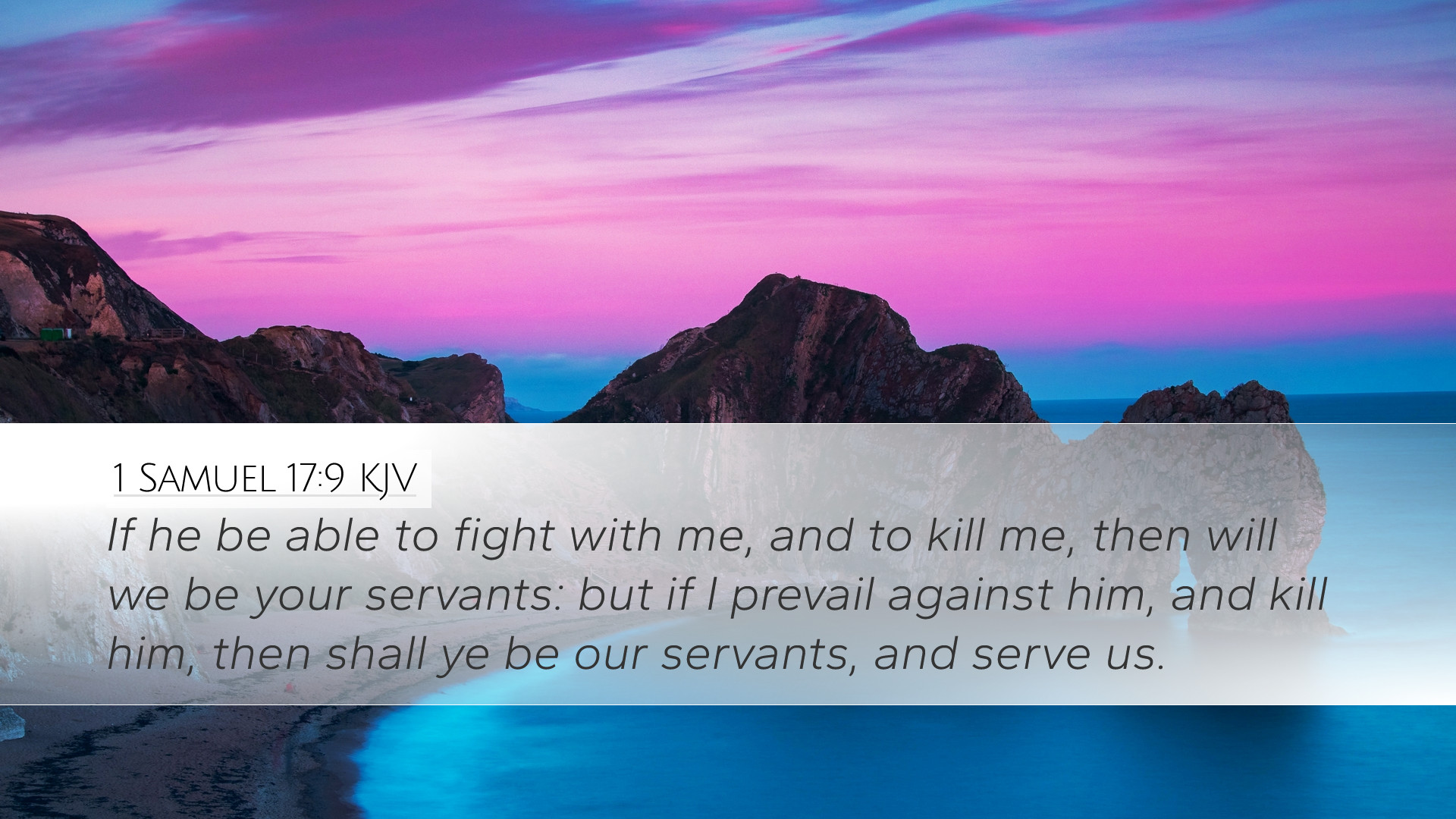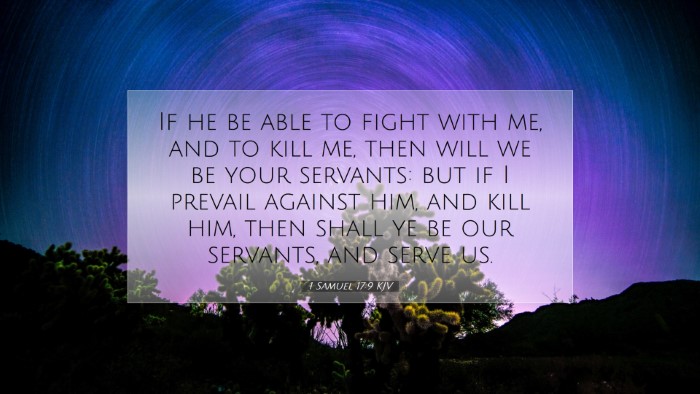Commentary on 1 Samuel 17:9
Verse Context: 1 Samuel 17:9 presents a pivotal moment in the narrative of David and Goliath. This verse is part of a larger account that highlights the battle between the Israelites and the Philistines, ultimately leading to David's remarkable victory.
Verse Text
"If he be able to fight with me, and to kill me, then will we be your servants: but if I prevail against him, and kill him, then shall ye be our servants, and serve us." (1 Samuel 17:9, KJV)
Overall Themes
- Challenge and Defiance: Goliath's challenge highlights the theme of confrontation between the forces of Israel and the Philistines.
- Faith and Courage: This situation sets the stage for the exhibit of David's unyielding faith in God contrasted with the fear of the Israelite army.
- Servitude and Authority: The conditions of servitude posed by Goliath underline the stakes involved in the battle, revealing the cultural dynamics of warfare in Ancient Israel.
Insights from Public Domain Commentaries
Matthew Henry's Commentary
Henry emphasizes that Goliath's boldness reflects the arrogance of the enemies of God, positioning himself as the ultimate champion. His taunts were not merely about physical strength but were aimed directly at undermining the faith of the Israelites. Henry notes that Goliath's challenge serves to provoke fear and despair within the Israelite ranks, which is a common tactic of the adversary. The verse sets a contrasting backdrop for David’s eventual faith-driven confrontation.
Albert Barnes' Notes on the Whole Bible
Barnes provides a thorough analysis of the implications of Goliath's challenge. He points out that the proposal of single combat was an ancient practice that expressed both personal and national conflict. Barnes further suggests that Goliath's audacity illustrates a deeper spiritual battle, reflecting the challenge of faith facing the Israelites. It was not just a fight between two men but a spiritual conflict showcasing God’s sovereignty against the might of human pride.
Adam Clarke's Commentary
Clarke elaborates on the mechanics of the challenge, noting that it reflects both bravery and folly. He argues that Goliath’s immense physical stature was not only intimidating but also symbolic of the overwhelming fears that believers often face. Clarke highlights the significance of the terms of surrender proposed by Goliath—the notion of servitude reveals the stakes involved and the potential despair that would come upon the Israelites if they failed. He also connects this event with the greater victory that God would orchestrate through David.
Theological Implications
This verse confronts contemporary readers with significant theological themes:
- The Power of Faith: David's faith, which burgeons against the despair and fear of the Israelites, invites reflection on the importance of trusting in God's providence in the face of adversity.
- Divine Sovereignty: The sovereign hand of God is at play even in this challenge, setting the stage for the miraculous intervention that would follow. This theme serves as a reminder that God often chooses the weak to confound the strong.
- Spiritual Warfare: The dynamics presented in this challenge mirror the spiritual battles faced by believers today, encouraging them to stand firm in faith against the Goliaths of their lives.
Application for Today’s Believers
This verse invites believers to reflect upon their own Goliaths. In various forms, challenges to faith persist, whether through personal trials, societal pressures, or spiritual doubts. The example of David illustrates that:
- Courage in the Face of Fear: Believers are called to approach their fears with courage, empowered by the belief that God is larger than any challenge.
- Active Faith: Like David, believers are encouraged to act upon their faith rather than succumb to intimidation.
- Community and Support: Just as Israel was in a community of fear, today’s believer is part of a community of faith, where mutual support can strengthen resolve against overwhelming odds.
Conclusion
1 Samuel 17:9 encapsulates the gritty challenge facing Israel, a challenge that reverberates through the annals of faith history. It showcases the dual themes of fear and faith, challenge and opportunity. The response from David, bolstered by deep faith, provides a model for all believers. In light of this verse, pastors and theologians may encourage congregations to face their Goliaths with the assurance that God stands with those who trust in Him.


